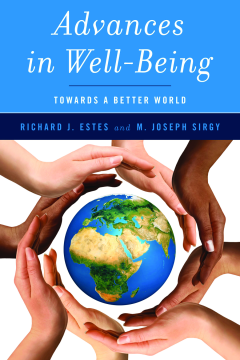
Additional Information
Book Details
Abstract
Media and research tend to focus on social problems in today's world - from terrorism and natural disasters to environmental degradation, conflict and economic decline. Yet many countries are also placing the promotion of well-being central at the heart of their social agenda. So what can we say about human progress and the development of civilization? This book considers the brighter side of our world today by exploring the ways in which wellbeing is on an upward swing globally.
Systematically considering indicators of human well-being in terms of economics, health and education, alongside subjective notions of wellbeing, the book draws together research and data from around the world. It uses the United Nations Development Programme's Human Development Index as an underlying framework from which to examine the ways in which wellbeing has improved since WWII. Analysing leading scholarship and empirical work aloows the authors to determine policy recommendations for how we might continue to build a better world of human wellbeing.
This book shows us that there are good reasons to be optimistic about the future of humanity. It is not only that there are positive trends in the main indicators of quality of life in all regions of the world but, fundamentally, that the desire to make good things happen seems to be intrinsic to human nature.
Mariano Rojas, President, International Society for Quality of Life Studies
Written by two gurus in the field, this is an excellent book illustrating how the science and application of well-being can create a better world. From the book, the readers will appreciate the historical and philosophical foundations of human well-being and gain insights on advances in this field. It is a book that cannot be missed by every human being.
Daniel Shek, Chair Professor of Applied Social Sciences, The Hong Kong Polytechnic University
This remarkable book by two of the most productive scholars in the field of quality of life studies is a delightfully readable overview of the last 100 years of research. The central focus is precisely where it should be, on economic, social, psychological and physical well-being aided and directed by cooperatively crafted evidence-based individual initiatives and public policies.
Alex Michalos, Professor Emeritus of Political Science, University of Northern British Columbia
Advances in Well-Being dispels 21st century pessimism when meticulously detailing how quality of life has improved for citizens living in both developed and developing countries over the century. Extraordinary gains in health, education and economic well-being have been achieved in spite of many social, political and economic set-backs. Drawing on evidence from around the globe, the book identifies the key drivers of this remarkable story of social progress. Readers of this richly illustrated and timely book will want to rethink their strategies for sustaining the momentum ‘to bring about the world we all want’ for future generations living on the planet.
Valerie Møller, Professor Emeritus, Quality of Life Studies, Institute of Social and Economic Research, Rhodes University
Richard Estes is Professor of Social Work at the University of Pennsylvania, USA.
M. Joseph Sirgy is Virginia Tech Real Estate Professor of Marketing at Virginia Polytechnic Institute and State University, USA.
Table of Contents
| Section Title | Page | Action | Price |
|---|---|---|---|
| Advances in Well-Being | Cover | ||
| Contents | vii | ||
| Foreword | ix | ||
| Preface | xi | ||
| Acknowledgments | xxiii | ||
| Part I | 1 | ||
| 1 Advances in Human Well-Being | 3 | ||
| Part II | 19 | ||
| 2 The Concept of Well-Being: Philosophical Wisdom from the Ages | 21 | ||
| 3 Health: The Cornerstone of Well-Being | 43 | ||
| 4 Economic Well-Being: An Essential Element in the Advancement of Well-Being | 87 | ||
| 5 Education: Dramatic Gains in Educational Well-Being | 143 | ||
| Part III | 213 | ||
| 6 Toward a More Positive Future for All | 215 | ||
| Part IV | 235 | ||
| Appendix A Selected Country Performances on the Human Development Index, 1990–2015 | 237 | ||
| Appendix B Supplemental Readings on Advances in Well-Being | 241 | ||
| Part V | 251 | ||
| Index | 253 | ||
| About the Authors | 267 |
